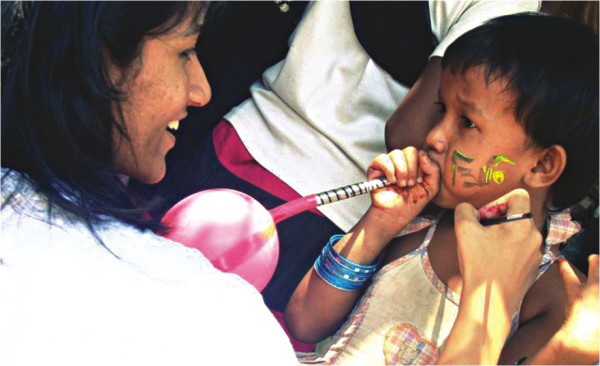| Extra Credit
Why Kindness Never Goes
Out of Fashion
Sabhanaz Rashid Diya
Photos: One Degree Initiative

One of the most recent 'developments' in the development sector in Bangladesh are youth-led organisations. With an intent to really change our country, groups of young people have gotten together and started movements in education, leadership, creative thinking and essentially, public service. Inspired by their ability to move people, several leagues of youth groups have begun their own movements through forming youth clubs, organisations, community service programmes and so on. As a social entrepreneur who falls somewhere in the former group of youth-led initiatives, of the many challenges we've faced one of the greatest criticisms we've come across is our value addition through short-term projects. While building schools, providing educational materials, building houses, repairing dams and providing training to start social businesses seem to seem long-term results, what is the benefit of hosting a one or two day-long event? Why does every youth organisation at every nook and corner seem to have one under its belt?
Sure, we could talk about giving back. We could say making someone smile is an invaluable reward. We could even say it's more fun and volunteerism needs to be fun if it were to attract our glam-driven young generation. In essence, and if we were to dangle around logic, what is the outcome of a day-long event under the label of a social campaign?
The first, and perhaps most obvious, reason is that it gets people involved. Our world is increasingly driven by materials as opposed to morals and values, and to get people to come together, do something and do it without quantifying the returns is itself an incredible task. Nobel Laureate Professor Muhammad Yunus often reminds us that human beings are inherently selfless, and in our desperation to compete and survive in a capitalistic society, this selflessness is overpowered by greed. If human beings were given one opportunity to be good without any fear or influence, they would get addicted to the idea and continue being selfless.
Now that we have our group of selfless individuals who want to contribute time and energy to doing good, what next? Our complexities, while is an extraordinary feature, habitually prevents us from appreciating life's blessings and human values. When people come together, they learn to work together and it's difficult to deny how nearly impossible unity can be in a 'politically correct' world. It teaches us teamwork, equity, leadership and empathy through a natural play of necessity where people are not paid to make things work, but would rather do it because it seems the best, if not the only way to do it.
We've gotten people together, we've made them work in teams, we've found elected and natural leaders, and we're getting some good actions in progress. But really, how are we adding value in a span of few hours? What are we teaching people? How will it alleviate poverty or help us reach by MDGs? That's where kindness pops in. While we are busy programming world-changing initiatives, setting targets, hiring people and designing advocacy campaigns, we tend to overlook a quality that is inherently ours, that is kindness. An act of kindness can go a long way, both in terms of the person who is doing something as well as the person who is receiving it. Kindness is rarely mistaken, seldom overruled and usually is returned through kindness. Maya Angelou words it perfectly: "I've learned that people will forget what you said, people will forget what you did, but people will never forget how you made them feel."
Imagine a day when you give away your toys to the small kid who works at your neighbour's apartment. Imagine a time when you helped a pregnant coworker deal with stress. Imagine a day when you read out stories to children on the streets. Imagine a day when you helped an elderly woman cross the road. Now, imagine the smile, the surprise and the feeling. It gives you a sense of belonging, of doing, of courage and a combination of intangible returns that, without your conscious realisation, sparks a light inside you. It helps you grow, mature, find happiness and most importantly, stay human.
Why do we believe in one-day events? Because it teaches people to be kind through life in a span of a few hours. In a rat race to meet deadlines, perhaps that's one quality that gets least attention, but has the most rewarding of returns, and can truly change the world.
(The writer is a major in Media and Communication at Independent University, Bangladesh, and the founder of the non-profit youth organisation, the One Degree Initiative foundation.)
|
|
|
